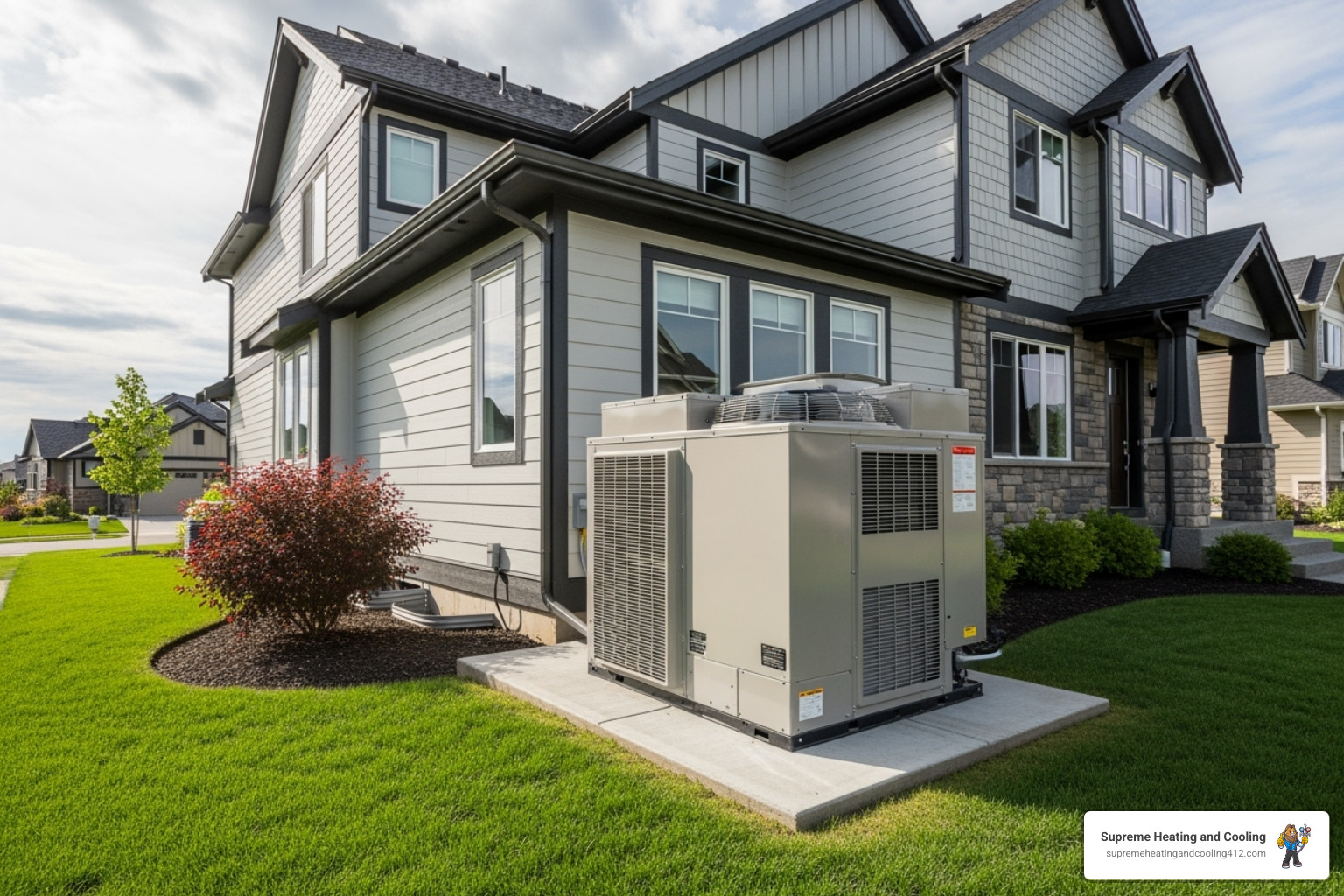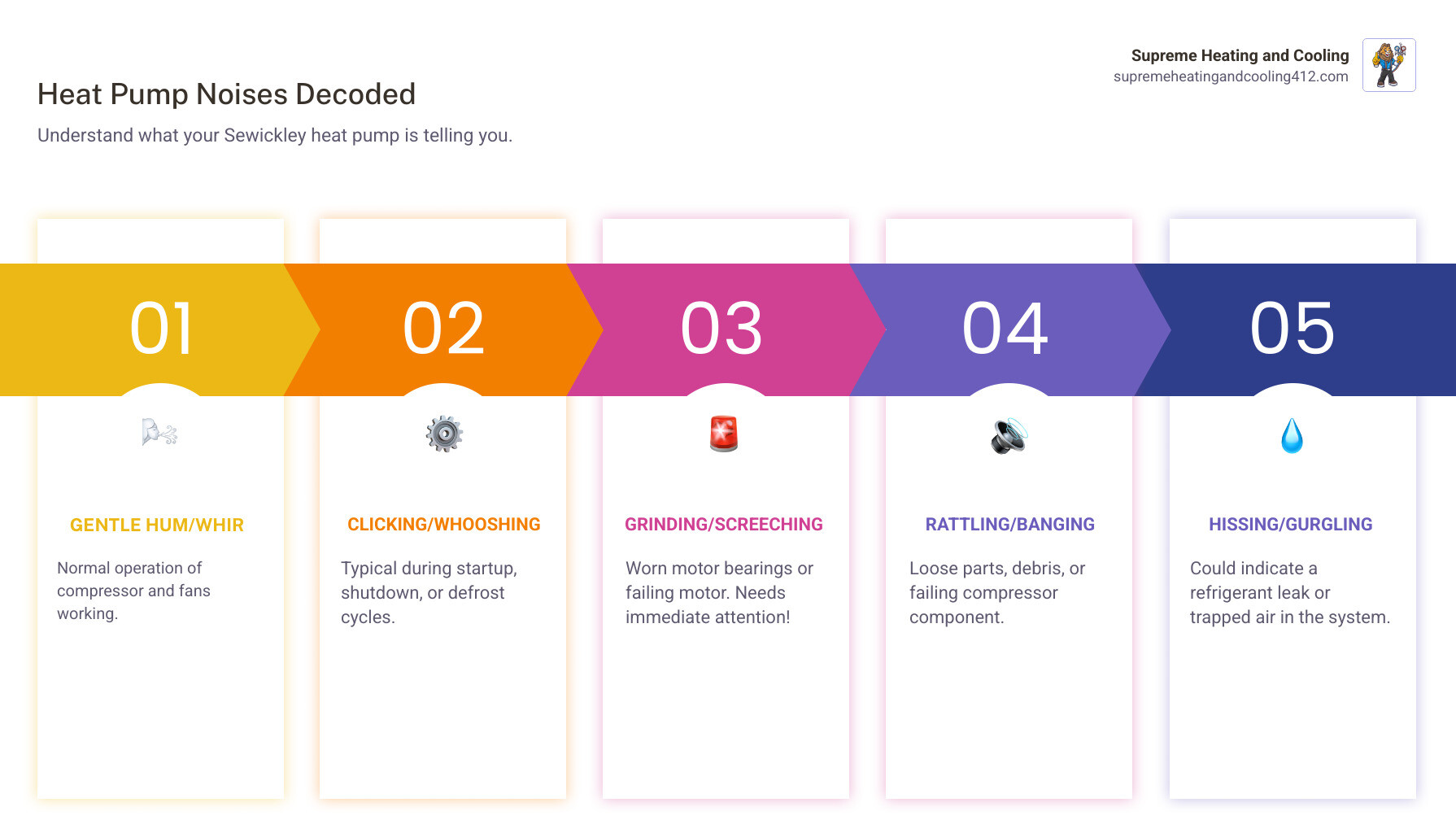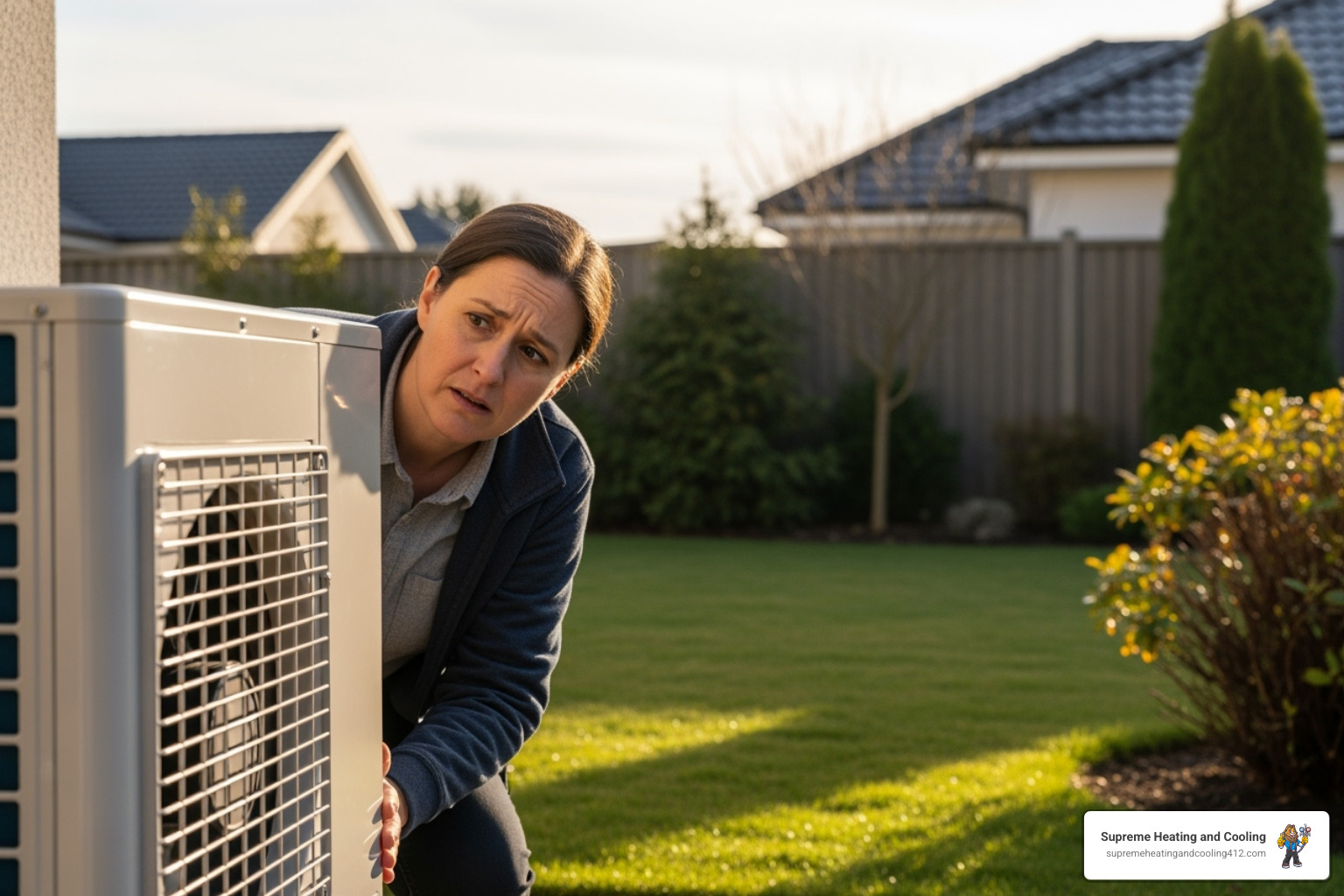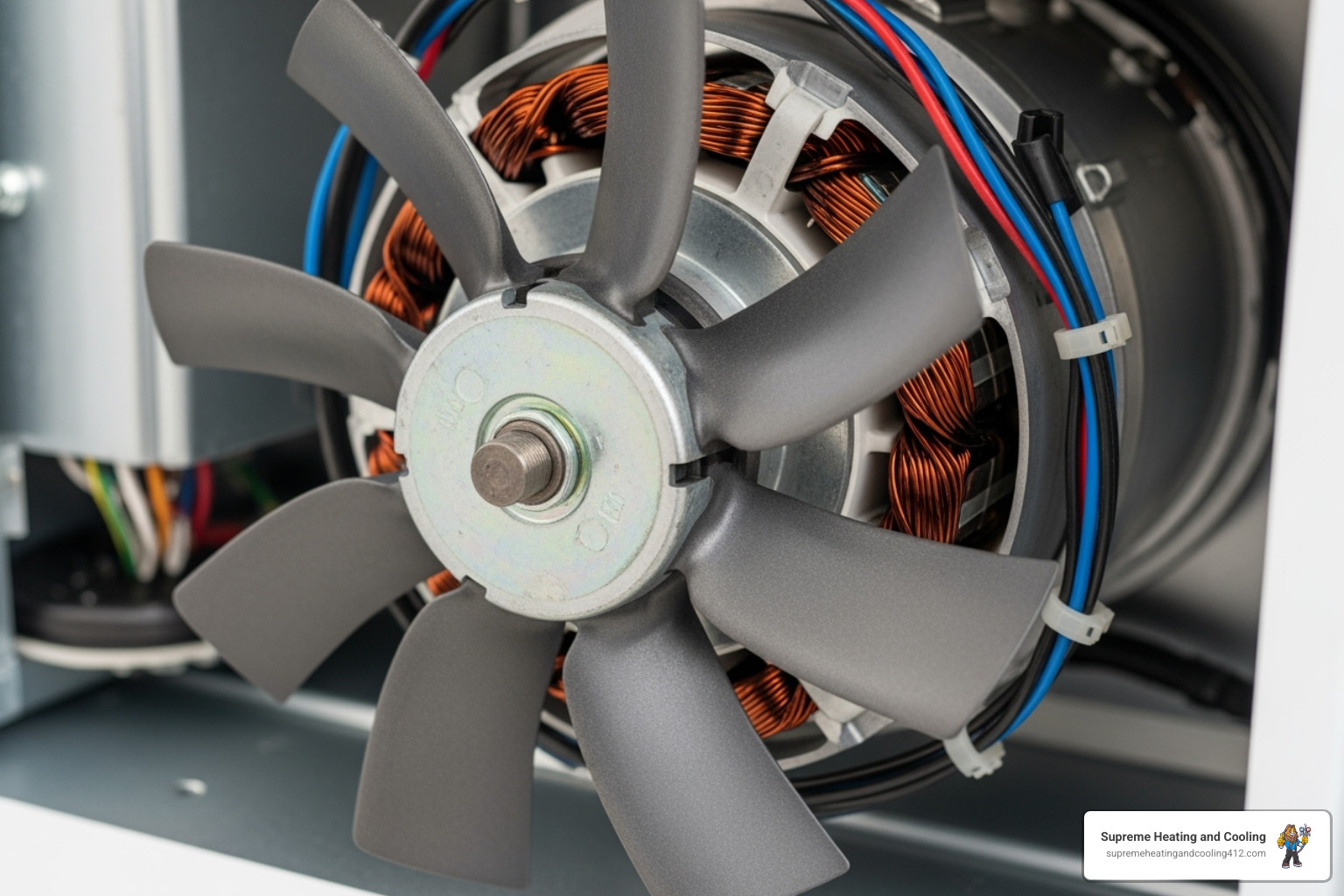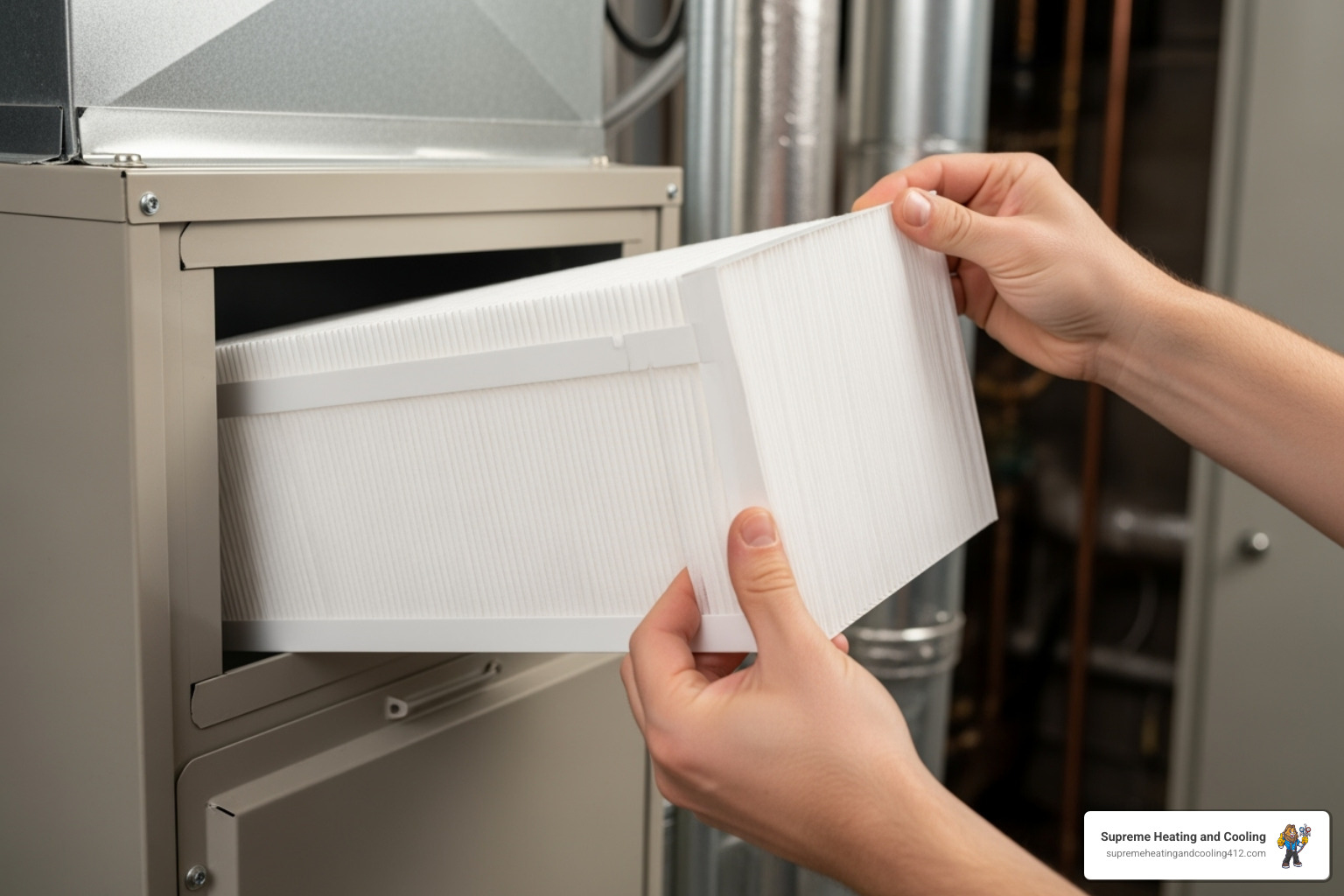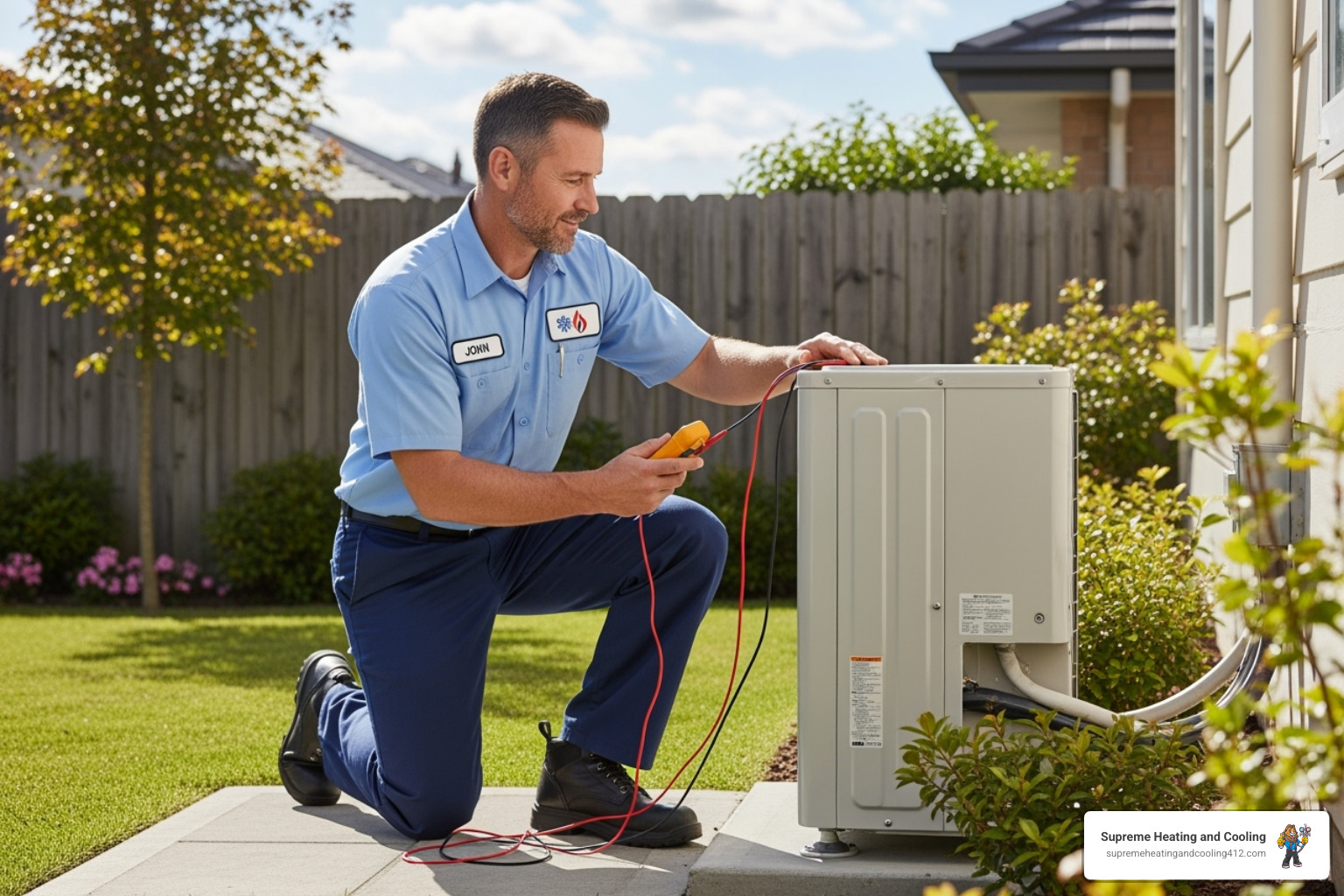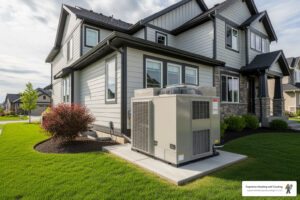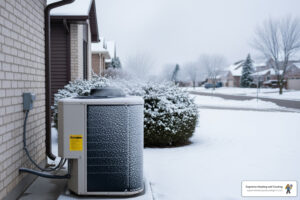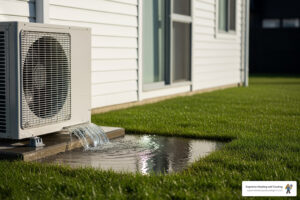Understanding Heat Pump Noises in Your Sewickley Home
When your heat pump making noise in sewickley, pa becomes loud enough to notice, it’s natural to wonder whether something’s wrong. Heat pumps produce some operational sounds, but certain noises signal problems that need immediate attention. Understanding the difference helps you protect your investment and maintain home comfort.
Quick Answer: What Different Heat Pump Noises Mean
- Normal sounds: Gentle humming, soft whirring, clicking at startup, whooshing during defrost cycles
- Problem sounds: Grinding or screeching (worn bearings), rattling or banging (debris or loose parts), hissing or gurgling (refrigerant leak), loud buzzing (electrical issues)
- When to call a pro: Any grinding, hissing, persistent banging, or if your system stops heating/cooling properly
- Safe DIY checks: Replace air filter, clear debris from outdoor unit, check for loose panels, ensure all registers are open
For comprehensive HVAC services throughout the Pittsburgh area, visit our Sewickley HVAC services page. If your heat pump is making concerning noises right now, schedule a diagnostic visit with Supreme Heating and Cooling to prevent further damage.
Sewickley’s climate, with its cold winters and humid summers, puts unique demands on heat pumps. Your system works harder during temperature fluctuations, especially during defrost cycles. This creates some expected sounds, but knowing which are normal versus problematic saves you from unnecessary worry and potential emergency repairs.
Is That Sound Normal? Differentiating Heat Pump Noises
When your heat pump making noise in Sewickley, PA, goes from a quiet hum to a concerning racket, it’s natural to wonder: “Is this normal, or do I need to worry?” While heat pumps make some sounds during regular operation, certain noises are a cry for help. Learning to tell the difference can save you from panic and prevent a small issue from becoming a major repair.
Sewickley’s weather keeps your heat pump working hard. Chilly winter mornings and humid summer afternoons mean your system is constantly adjusting. When temperatures drop, your heat pump works overtime to extract heat from the cold air, which can make the compressor and fans run louder than usual.
Then there’s frost. In cold weather, ice naturally builds up on your outdoor coils, and your heat pump periodically switches into defrost mode to melt it away. These defrost cycles introduce their own set of sounds—some perfectly normal, others worth investigating.
Understanding what’s happening with your heat pump making noise in Sewickley, PA starts with knowing which sounds are just part of the job and which ones signal trouble ahead.
Normal Operational Sounds
Let’s talk about the sounds that mean everything’s working as it should. These are the everyday noises of a healthy heat pump doing its thing.
Gentle humming or whirring is the most common sound you’ll hear. This steady hum comes from your compressor and fans working together to circulate refrigerant. “Whirring or humming is typically the sound of the compressor and fans working together to circulate refrigerant and maintain temperature consistency,” explains a Supreme Heating and Cooling technician. “Slight variations in these sounds are normal, but if you notice sudden changes, it’s best to have it checked.” Think of this as your heat pump’s heartbeat—quiet and steady.
Clicking on startup and shutdown is another sound that catches people off guard, but it’s completely normal. When your system kicks on or powers down, electrical relays engage or disengage, and the reversing valve shifts position. These clicks are just your heat pump’s electrical components doing their job.
Whooshing or hissing during defrost cycles can sound alarming if you don’t know what’s happening. When frost builds up on your outdoor coil, your heat pump switches into defrost mode to melt it. During this cycle, you might hear whooshing as the fan reverses or a gentle hiss as ice melts. This is your system efficiently managing itself—nothing to worry about.
Sounds That Signal a Problem
Now we get to the noises that should grab your attention. When your heat pump making noise in Sewickley, PA sounds less like background hum and more like something’s seriously wrong, it’s time to investigate.
“Unusual noises should never be ignored,” advises a Supreme Heating and Cooling expert. “Prompt inspection and maintenance are key for quiet, efficient heat pump operations.” These warning sounds often point to underlying issues that will only get worse if you wait.
Grinding or screeching sounds are never good news. These harsh, metallic noises typically mean something mechanical is wearing down or failing.
Rattling or banging can point to several problems, from simple debris in your outdoor unit to loose panels or a failing compressor.
Hissing or gurgling sounds often relate to your refrigerant system. A sharp hissing could indicate a refrigerant leak, while gurgling might mean air is trapped in the lines.
Loud buzzing is typically an electrical red flag, signaling a failing capacitor, a connection issue, or a motor problem.
In the next section, we’ll dive deeper into each of these problematic sounds, exploring what causes them and what you should do.
A Homeowner’s Guide to Common Problematic Noises Your Heat Pump Might Make in Sewickley, PA
When your heat pump making noise in Sewickley, PA starts sounding less like a gentle hum and more like a warning siren, it’s time to investigate. These unusual noises are your system’s way of telling you something needs attention—and listening now can save you from bigger headaches down the road.
Ignoring these warning signs can lead to decreased efficiency, higher energy bills, and eventually, a complete system breakdown. We’ve compiled a guide to the most common problematic heat pump noises and what they usually signify.
Grinding or Screeching
A grinding or screeching sound is a serious warning. This metallic, high-pitched noise indicates a mechanical problem that requires immediate attention. You should turn the system off right away.
The most common culprit is worn-out motor bearings. When bearings wear down, metal grinds against metal. If left unaddressed, this friction can lead to complete motor failure. Sometimes the grinding indicates a failing motor itself or a bent or broken fan blade hitting another component.
What to do: If you hear grinding or screeching, immediately shut down your heat pump. Continued operation could transform a fixable problem into a much more expensive system replacement. Give us a call, and we’ll get your system back to its quiet, efficient self.
Rattling or Banging
Rattling or banging noises from your heat pump making noise in Sewickley, PA deserve your attention. These sounds often suggest something is loose, obstructed, or failing internally.
The outdoor unit is exposed to the elements, so debris is a common troublemaker. Twigs, leaves, or acorns can get into the fan blades, creating a rattling sound. Sometimes the problem is simply loose panels or components that rattle with the system’s vibrations.
More concerning is when a persistent banging indicates a failing compressor. The compressor is the heart of your heat pump, and internal issues can manifest as loud, rhythmic banging. If the rattling seems to come from inside your home, you might have loose ductwork.
What to do: For rattles, a quick visual inspection might reveal obvious debris or loose panels you can safely address. However, for internal banging or persistent rattles you can’t identify, it’s best to consult with a professional.
Hissing or Gurgling
A hissing or gurgling sound often points to issues with the refrigerant. Without proper refrigerant flow, your heat pump can’t move heat effectively.
A hissing sound is most commonly caused by a refrigerant leak. When refrigerant escapes from a line, it creates that distinct hissing noise. This is not just a performance issue; refrigerant needs to stay contained within your system.
If refrigerant levels drop too low due to a leak, the system might produce gurgling or bubbling sounds. Gurgling can also indicate trapped air within the refrigerant lines, which reduces efficiency.
What to do: Refrigerant leaks require immediate professional attention. A low refrigerant charge forces your heat pump to work overtime, leading to higher energy bills and potential compressor damage. If you hear hissing or gurgling, contact us promptly.
Loud Buzzing or Humming
While a gentle hum is normal, a loud buzzing or humming that’s more pronounced than usual can signal trouble for your heat pump making noise in Sewickley, PA.
Many loud buzzing sounds stem from electrical problems, such as a failing capacitor or a loose electrical connection. Electrical issues can be dangerous and should always be addressed by a professional.
Capacitors provide the initial jolt of electricity to start motors. When a capacitor fails, the motor might hum loudly without actually starting. Sometimes a loud buzzing indicates a frozen outdoor unit that is struggling to operate.
What to do: If you hear a loud or unusual buzzing, especially if the unit isn’t heating or cooling as it should, shut it down and call for service. Electrical issues can be hazardous, and a frozen unit could indicate problems with the defrost system that will only get worse.
What to Do About a Noisy Heat Pump
When your heat pump making noise in Sewickley, PA starts acting up, it’s natural to feel concerned. Addressing unusual noises promptly protects your investment and prevents small problems from becoming expensive emergencies.
Think of strange sounds as your heat pump’s way of communicating. It’s telling you something needs attention, and the sooner you respond, the better. Waiting can affect your system’s efficiency and lead to higher energy bills or even complete system failure.
DIY Troubleshooting for a Heat Pump Making Noise in Sewickley, PA
Before calling a professional, you can perform several safe checks. These steps might resolve the issue or provide valuable information for a technician. Always turn off the power to your unit at the thermostat and the electrical breaker before any inspection.
- Check your air filter. A clogged filter restricts airflow and can cause whistling or rattling sounds. Replace 1-inch filters every 1-3 months and thicker media filters every 6-12 months.
- Clear the outdoor unit. In Sewickley’s leafy neighborhoods, twigs and grass clippings can easily get inside your unit. With the power off, carefully remove any visible debris and ensure at least 18-24 inches of clearance on all sides.
- Check for loose panels. Normal vibrations can loosen screws, causing rattles. Gently push on the access panels and tighten any loose screws you find.
- Inspect your registers. Make sure all supply and return registers inside your home are open and not blocked by furniture or rugs.
- Look for excessive ice. In winter, some frost is normal, but a heavy coating of ice indicates a problem with the defrost cycle. Turn the unit off to thaw and call a professional if it happens again.
Why Ignoring a Heat Pump Making Noise in Sewickley, PA is Risky
It’s tempting to hope an odd noise will disappear, but that’s rarely how it works with heat pumps. Ignoring warning signs puts your comfort and your wallet at risk.
- Minor issues can escalate. A grinding sound from a worn bearing can destroy the entire motor if left unchecked, turning a simple repair into a costly replacement.
- Energy bills will increase. A struggling system has to work overtime to maintain your desired temperature, consuming more electricity.
- Complete system failure is possible. The worst-case scenario is a total breakdown on the coldest night of winter or the hottest day of summer.
Addressing problems early almost always costs less than waiting for a breakdown. An annoying rattle that could be a simple adjustment might require replacing multiple components if ignored.
When to Call an HVAC Technician
While DIY checks are great, some problems require professional expertise. Knowing when to call Supreme Heating and Cooling can save you from making a situation worse.
Call a professional for these issues:
- Grinding or screeching sounds indicate a failing motor or bearings. Turn off your system and call us immediately to prevent catastrophic failure.
- A persistent hissing noise almost always signals a refrigerant leak. Handling refrigerants is complicated and requires special equipment. For safety reasons, this task should only be performed by a trained professional.
- If DIY checks don’t stop the banging or rattling, an internal component like the compressor or fan motor may be the cause. This requires professional diagnosis.
- Loud buzzing or humming often indicates an electrical problem, like a failing capacitor or loose wiring. These pose serious safety risks and require expert handling.
- If your heat pump isn’t heating or cooling properly, its primary function is compromised. The cause could be low refrigerant, a bad reversing valve, or other issues needing professional evaluation.
- Any sudden, severe noise demands immediate action. Turn off your system and call for emergency service, as these sounds signal dangerous internal failures.
- If your outdoor unit repeatedly develops heavy ice buildup, it indicates a problem with your defrost system or airflow that our technicians can diagnose and fix.
When in doubt, call us. Our team at Supreme Heating and Cooling has the training, tools, and experience to diagnose complex issues accurately and provide lasting solutions.
How Regular Maintenance Prevents Noisy Surprises
Most noisy surprises from a heat pump making noise in Sewickley, PA, are preventable with regular maintenance. Just like a car needs oil changes, your heat pump needs routine care to run smoothly and last longer.
Preventative care is the secret to system longevity and peak efficiency. During scheduled maintenance, we actively prevent the wear and tear that leads to alarming sounds. By cleaning coils, lubricating moving parts, and inspecting electrical connections, we address minor issues before they escalate, keeping your system quiet and efficient.
During a maintenance visit, we focus on several key tasks:
- Cleaning coils: Dirty coils, common in leafy areas like Sewickley, force your heat pump to work harder and louder. This increases wear on components. We clean the coils to ensure efficient, quiet operation.
- Lubricating moving parts: Moving parts like motors and bearings need lubrication to prevent friction, grinding, and squealing. Our technicians lubricate these components to keep your system running silently.
- Inspecting electrical connections: We inspect and tighten all electrical connections to prevent dangerous buzzing sounds and ensure safe operation.
Beyond these tasks, maintenance visits give us the opportunity to spot minor problems before they become major headaches. Catching a slightly worn belt or a fan blade that’s beginning to wobble means you won’t wake up on the coldest night of the year to grinding noises and no heat.
We recommend scheduling maintenance twice a year—once before heating season and once before cooling season. This proactive approach keeps your system in top shape, ensuring it runs quietly, efficiently, and reliably when you need it most.
Conclusion: Restore Peace and Quiet to Your Sewickley Home
Your home should be a sanctuary of comfort and quiet. If you’ve been dealing with a heat pump making noise in Sewickley, PA, we hope this guide has helped you understand what your system is trying to tell you.
Remember the difference between normal sounds (humming, whooshing) and problem noises. Grinding or screeching suggests motor trouble, rattling or banging points to debris or loose parts, hissing or gurgling signals refrigerant issues, and loud buzzing often indicates an electrical problem.
The key takeaway? Don’t ignore unusual noises. What starts as a minor annoyance can become a major expense. Taking action early, whether through simple DIY checks or professional diagnosis, protects your investment and keeps your home comfortable.
Regular maintenance remains your best defense against noisy surprises. By scheduling routine tune-ups, you ensure that small issues get caught before they escalate into loud, costly problems.
If your heat pump is currently making sounds that concern you, don’t wait. Our team at Supreme Heating and Cooling is here to help restore the peace and quiet you deserve. We pride ourselves on trustworthy, straightforward service—no pressure, no pushy sales tactics, just honest expertise from a team that cares about your comfort.
Ready to silence that noisy heat pump? Schedule a diagnostic visit with Supreme Heating and Cooling today. For more information about all our HVAC services throughout the Pittsburgh area, visit our Sewickley HVAC services page. Let’s get your system running smoothly and quietly again.

